Fery
International Hazard
    
Posts: 1026
Registered: 27-8-2019
Location: Czechoslovakia
Member Is Offline
|
|
1,3,5-trithiane
1,3,5-trithiane = thioformaldehyde trimer
To a 125 ml washing bottle were added these 2 liquids by weight:
0,25 mol 38% formaldehyde CH2O 20,0 g
51 g 35% HCl (should be 43 cm3)
H2S generator was constructed this way:
60 g 35% HCl + 40 g H2O were poured into 500 ml long neck FBF, magnetic stirbar added.
0,50 mol Na2S = 39 g, assuming technical 60% Na2S (approx trihydrate) it is 0,30 mol was dissolved in 300 ml of water and charged into dropping
funnel.
The apparatus was transferred outside of lab. The temperature outside was 0 C (winter time).
The H2S generator was put on magnetic stirrer and connected with a hose with the washing bottle.
Magnetic stirring of HCl was commenced and the solution of Na2S was slowly dropped into diluted HCl. Evolved H2S gas was bubbled into the washing
bottle which lasted 3 hours. At the end the content in washing bottle was semisolid paste (due this I expect the bubbling of H2S was very inefficient
at the end).
Content from washing bottle was washed out with water, gravity filtered, solid product twice suspended in 200 ml H2O and filtered out, final filtrate
only little acidic (univesal pH paper approx pH 3).
Air dried for 1 week close to wood stove at temperatures around 50 C.
3,7 g crude product transferred into extraction thimble, extracted in 100 ml Soxhlet apparatus with 150 ml of benzene.
2,5 g of white crystals in a form of needles obtained = 18 mmol (M=138,27 g/mol), yield 22% (very poor, orgsyn got circa 90 %)
m.p. 217-219 (lit. 215-220 C https://en.wikipedia.org/wiki/1,3,5-Trithiane)
http://orgsyn.org/Content/pdfs/procedures/CV2P0610.pdf
Attachment: CV2P0610.pdf (365kB)
This file has been downloaded 247 times
apparatus
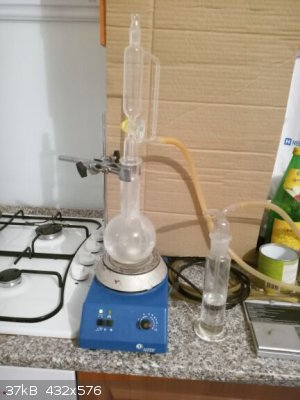
technical Na2S, yellow because of oxidation to polysulfides
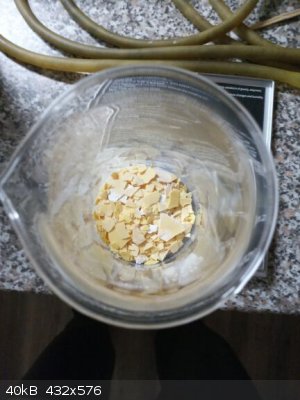 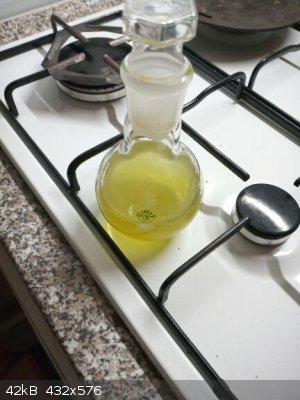
content in washing bottle after transferring it from outside into the lab
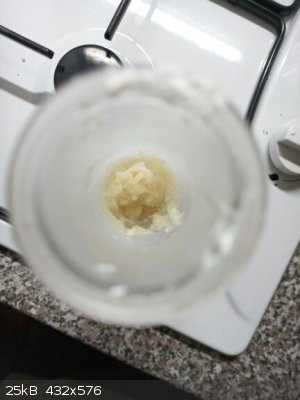 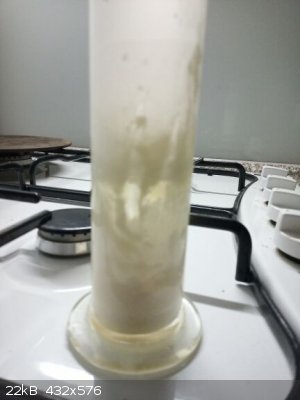
very thick content from washing bottle transferred into a beaker by washing it with water
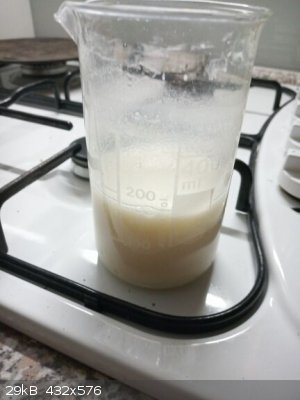 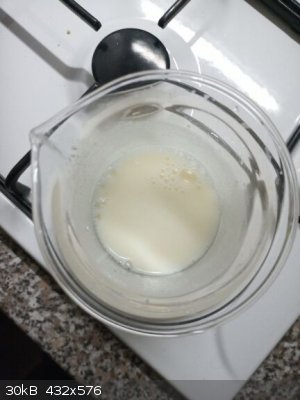
gravity filtered on filter paper
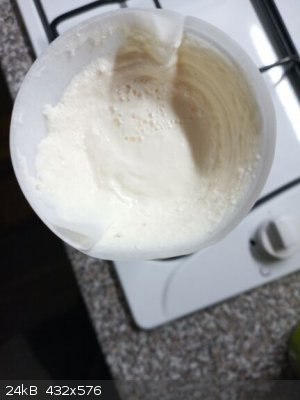
twice suspended in 200 ml of water and gravity filtered
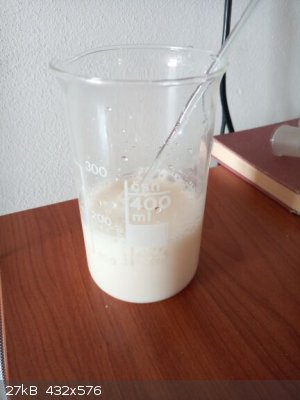
3,7 g dry crude product extracted in 100 ml Soxhlet apparatus with 150 ml of benzene
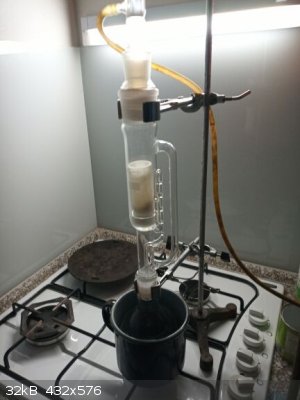
2,5 g of white needle form crystals obtained, m.p. 217-219 C
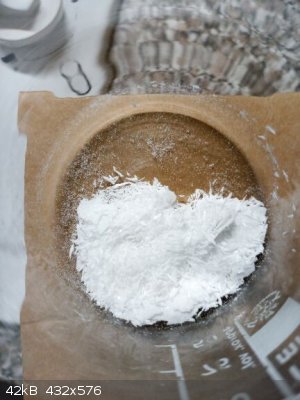
[Edited on 28-3-2022 by Fery]
|
|
|
SplendidAcylation
Hazard to Others
  
Posts: 203
Registered: 28-10-2018
Location: Starving in some deep mystery
Member Is Offline
Mood: No one I think is in my tree.
|
|
Nice work!
I do love a write-up with photographs
Well done for working with hydrogen sulfide without having the neighbours complain.
I made some FeS for making hydrogen sulfide but I haven't done it yet.
Shame about the lowish yield, hmm, maybe the removal of the solid throughout the process is supposed to push the reaction forward?
This rxn seems to be a nice example of the double-bond rule, thioformaldehyde preferring to trimerize rather than remain with a C=S bond
Do you have any plans for this compound?
[Edited on 28-3-2022 by SplendidAcylation]
|
|
|
Fery
International Hazard
    
Posts: 1026
Registered: 27-8-2019
Location: Czechoslovakia
Member Is Offline
|
|
Hi SplendidAcylation, orgsyn bubbled H2S for 12-24 hours, me for only 3 hours, that could be the reason. But after 3 hours the content was almost
solid, seems to be some polythioformadehyde polymer with copious volume trapping all the liquid? In orgsyn they filtered it few times and continued
bubbling into the filtrate (that would require sintered glass as cellulose filter paper would not survive concentrated HCl). Moreover during my
experiment there was 0 C outside which is not desirable for formaldehyde (it should be stored above 6 C) - maybe it also polymerized at some degree?
Worth to try during warmer period. On the other side solubility of H2S in H2O is higher at lower temperature... Most of H2S did not react, maybe it
would be worth using much taller and narrower cylinder or connect few cylinders in parallel?
The cheapest H2S generator is paraffin + S + heat. Paraffin could be cost-free from remainder from almost burned off candles.
In the extraction thimble there stayed approx 1 gram of unknown white compound, perhaps some polymer.
I do not have any planes with trithiane yet, this was my first step into organosulfur compounds. Well I did some sulfonations (toluene, naphthalene)
which almost does not counts into organosulfur chemistry as it is almost as nitration. My dream is trimer of thioacetone but I'm not yet brave enough.
Neighbors were already in homes luckily and no passersby on the street.
Another notes: use the oldest glass you have and the oldest glass tube (I used inner diameter 4 mm which was OK and it did not clog). It is very hard
to clean the glass. I approximate solubility of trithiane in boiling benzene approximately 1 g of trithiane in 100 ml and this is perhaps the best
solvent? Perhaps the higher polymers are even worse to clean from glass? Perhaps I produced also some polyformaldehyde due to very low temperature?
Avoid messing sintered glass if you can as I can't imagine how to clean it mechanically. Even if you clean with piranha solution you won't see whether
it is really clear as the color of trithiane is white.
For cleaning I used acetone at room temperature and mechanical force (bottle brush and pipette brush). Very hard to clean. Maybe using wet sand
shaking the glass would be the way to go?
Odor of trithiane is very very very weak, much weaker than mineral waters containing a little of H2S which are common in my country.
|
|
|
Metacelsus
International Hazard
    
Posts: 2542
Registered: 26-12-2012
Location: Boston, MA
Member Is Offline
Mood: Double, double, toil and trouble
|
|
Nice work. For the extraction, is benzene necessary or could you use another solvent such as toluene?
|
|
|
Fery
International Hazard
    
Posts: 1026
Registered: 27-8-2019
Location: Czechoslovakia
Member Is Offline
|
|
Hi Metacelsus, perhaps toluene could be used too. Maybe the trithiane could be even better soluble due to higher b.p. of toluene. M.p. of trithiane is
quite high (above 200 C). Maybe xylene could be tried too (even higher b.p.) ? The solubility in benzene is quite low, only aprroximately 1 g
trithiane in 100 ml of benzene.
|
|
|
mayko
International Hazard
    
Posts: 1218
Registered: 17-1-2013
Location: Carrboro, NC
Member Is Offline
Mood: anomalous (Euclid class)
|
|
This is a really cool compound and well documented reaction. I would be extra careful around formaldehyde/HCl mixtures; bischloromethylether gives me
the willies!
al-khemie is not a terrorist organization
"Chemicals, chemicals... I need chemicals!" - George Hayduke
"Wubbalubba dub-dub!" - Rick Sanchez
|
|
|
wg48temp9
National Hazard
   
Posts: 786
Registered: 30-12-2018
Location: not so United Kingdom
Member Is Offline
|
|
Great write up Fery for this interesting compound.
I was curious about the compound but did not find much info on it. I did find a patent that describes a method of converting it to carbon disulphide
by heating with sulphur and a catalytic amount of alkali/alkali earth hydroxide. Not the simplest method of making CS2.
Sorry I cannot find the reference at the moment. I will search again later.
I found it: Attachment: CS2-syn-US3404961.pdf (248kB)
This file has been downloaded 246 times
Oops that was the wrong patent. This one only requires a temperature of about 200C
Attachment: CS2-bestsyn-US3397960.pdf (512kB)
This file has been downloaded 273 times
[Edited on 3/30/2022 by wg48temp9]
I am wg48 but not on my usual pc hence the temp handle.
Thank goodness for Fleming and the fungi.
Old codger' lives matters, wear a mask and help save them.
Be aware of demagoguery, keep your frontal lobes fully engaged.
I don't know who invented mRNA vaccines but they should get a fancy medal and I hope they made a shed load of money from it.
|
|
|
Fery
International Hazard
    
Posts: 1026
Registered: 27-8-2019
Location: Czechoslovakia
Member Is Offline
|
|
In the orgsyn epilogue there is a synthesis where they drop solution of sulfide instead of bubbling H2S gas. But my Na2S was technical quality, old
and a lot of S2- oxidized into polysulfides so I discarded that idea of dropping into formaldehyde thus introducing contamination with elementary S.
There was a lot of elementary sulfur in the generator at the end as polysulfides react with HCl into H2S and elementary S. Maybe preparing fresh
solution by bubbling H2S into solution of NaOH and then delivering this solution very slowly to the bottom of formaldehyd+HCl using long tube
submerged just over the bottom of the reacting flask? In my experiment most of H2S was just gone and did not dissolve / react. Bubbling into NaOH
would bind most of it and no such high loses of H2S. But then the problem of delivering the fresh Na2S or even NaHS to the bottom of reactor (dripping
to the top of reactor = most of H2S would escape...).
|
|
|